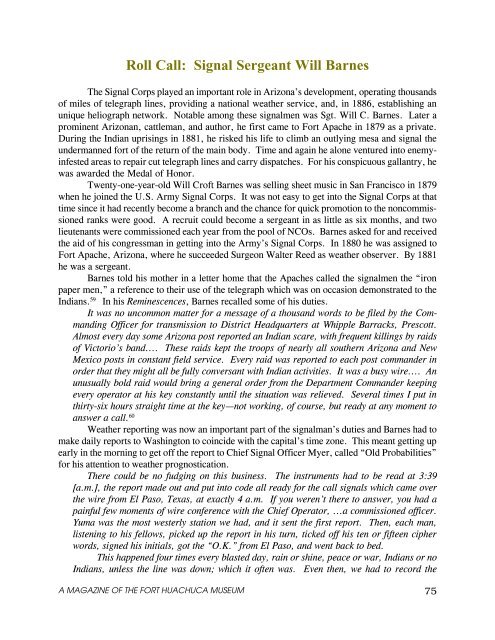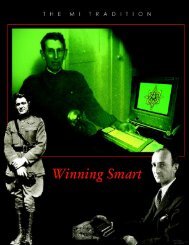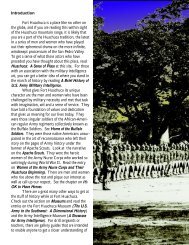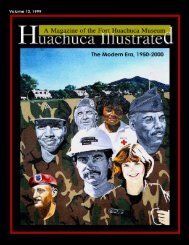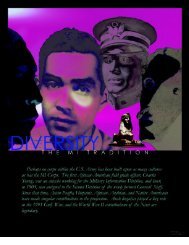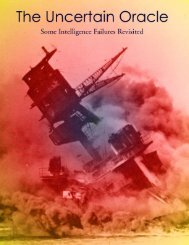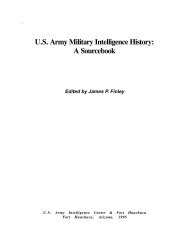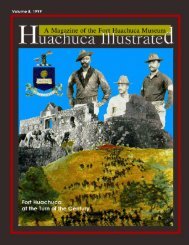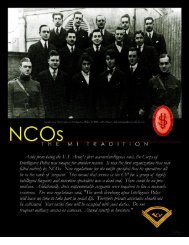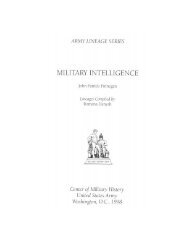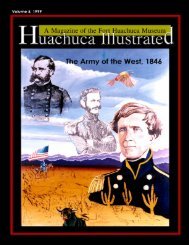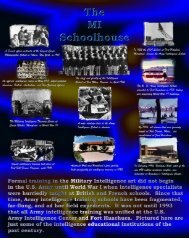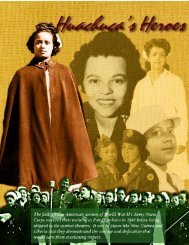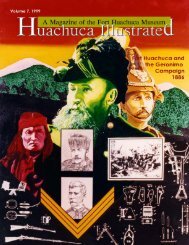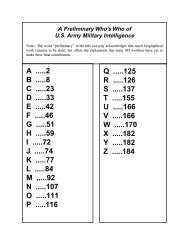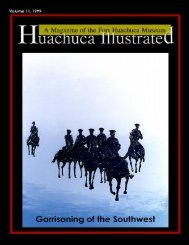Apache Campaigns - Fort Huachuca - U.S. Army
Apache Campaigns - Fort Huachuca - U.S. Army
Apache Campaigns - Fort Huachuca - U.S. Army
Create successful ePaper yourself
Turn your PDF publications into a flip-book with our unique Google optimized e-Paper software.
Roll Call: Signal Sergeant Will Barnes<br />
The Signal Corps played an important role in Arizona’s development, operating thousands<br />
of miles of telegraph lines, providing a national weather service, and, in 1886, establishing an<br />
unique heliograph network. Notable among these signalmen was Sgt. Will C. Barnes. Later a<br />
prominent Arizonan, cattleman, and author, he first came to <strong>Fort</strong> <strong>Apache</strong> in 1879 as a private.<br />
During the Indian uprisings in 1881, he risked his life to climb an outlying mesa and signal the<br />
undermanned fort of the return of the main body. Time and again he alone ventured into enemyinfested<br />
areas to repair cut telegraph lines and carry dispatches. For his conspicuous gallantry, he<br />
was awarded the Medal of Honor.<br />
Twenty-one-year-old Will Croft Barnes was selling sheet music in San Francisco in 1879<br />
when he joined the U.S. <strong>Army</strong> Signal Corps. It was not easy to get into the Signal Corps at that<br />
time since it had recently become a branch and the chance for quick promotion to the noncommissioned<br />
ranks were good. A recruit could become a sergeant in as little as six months, and two<br />
lieutenants were commissioned each year from the pool of NCOs. Barnes asked for and received<br />
the aid of his congressman in getting into the <strong>Army</strong>’s Signal Corps. In 1880 he was assigned to<br />
<strong>Fort</strong> <strong>Apache</strong>, Arizona, where he succeeded Surgeon Walter Reed as weather observer. By 1881<br />
he was a sergeant.<br />
Barnes told his mother in a letter home that the <strong>Apache</strong>s called the signalmen the “iron<br />
paper men,” a reference to their use of the telegraph which was on occasion demonstrated to the<br />
Indians. 59 In his Reminescences, Barnes recalled some of his duties.<br />
It was no uncommon matter for a message of a thousand words to be filed by the Commanding<br />
Officer for transmission to District Headquarters at Whipple Barracks, Prescott.<br />
Almost every day some Arizona post reported an Indian scare, with frequent killings by raids<br />
of Victorio’s band.... These raids kept the troops of nearly all southern Arizona and New<br />
Mexico posts in constant field service. Every raid was reported to each post commander in<br />
order that they might all be fully conversant with Indian activities. It was a busy wire.... An<br />
unusually bold raid would bring a general order from the Department Commander keeping<br />
every operator at his key constantly until the situation was relieved. Several times I put in<br />
thirty-six hours straight time at the key—not working, of course, but ready at any moment to<br />
answer a call. 60<br />
Weather reporting was now an important part of the signalman’s duties and Barnes had to<br />
make daily reports to Washington to coincide with the capital’s time zone. This meant getting up<br />
early in the morning to get off the report to Chief Signal Officer Myer, called “Old Probabilities”<br />
for his attention to weather prognostication.<br />
There could be no fudging on this business. The instruments had to be read at 3:39<br />
[a.m.], the report made out and put into code all ready for the call signals which came over<br />
the wire from El Paso, Texas, at exactly 4 a.m. If you weren’t there to answer, you had a<br />
painful few moments of wire conference with the Chief Operator, ...a commissioned officer.<br />
Yuma was the most westerly station we had, and it sent the first report. Then, each man,<br />
listening to his fellows, picked up the report in his turn, ticked off his ten or fifteen cipher<br />
words, signed his initials, got the “O.K.” from El Paso, and went back to bed.<br />
This happened four times every blasted day, rain or shine, peace or war, Indians or no<br />
Indians, unless the line was down; which it often was. Even then, we had to record the<br />
A MAGAZINE OF THE FORT HUACHUCA MUSEUM<br />
75


